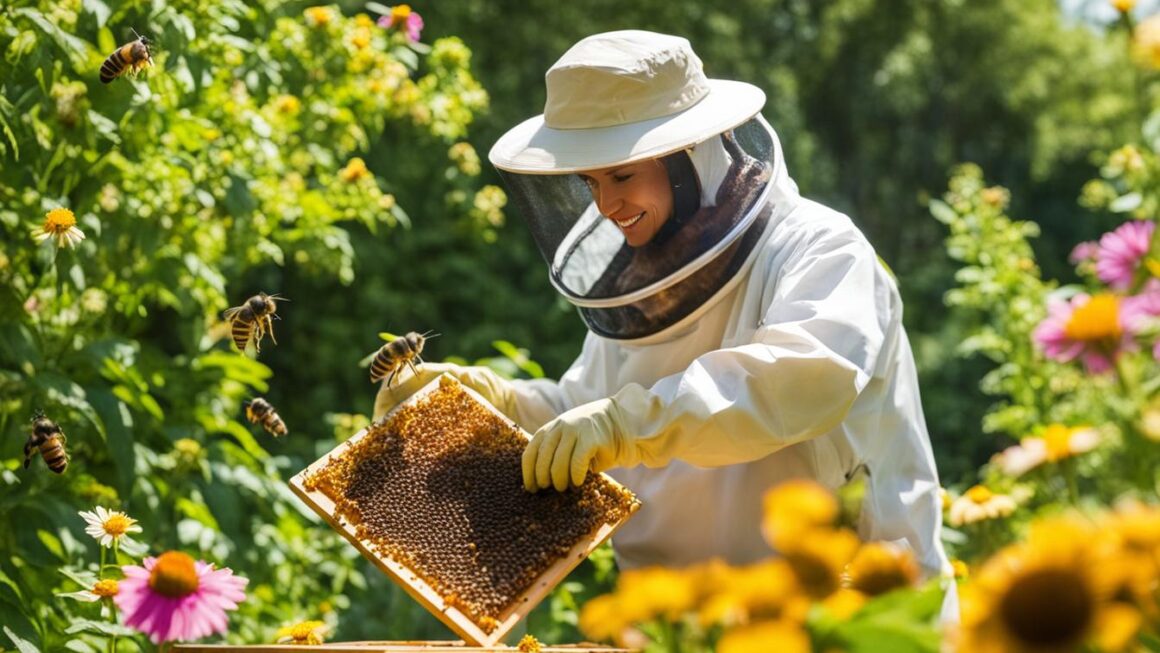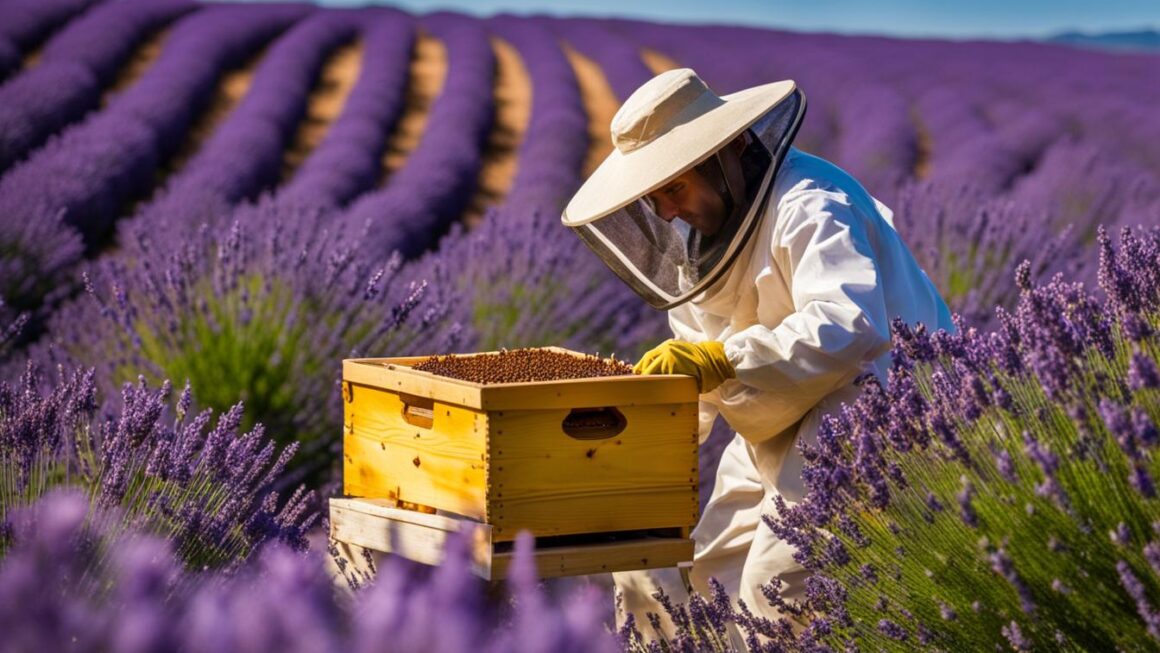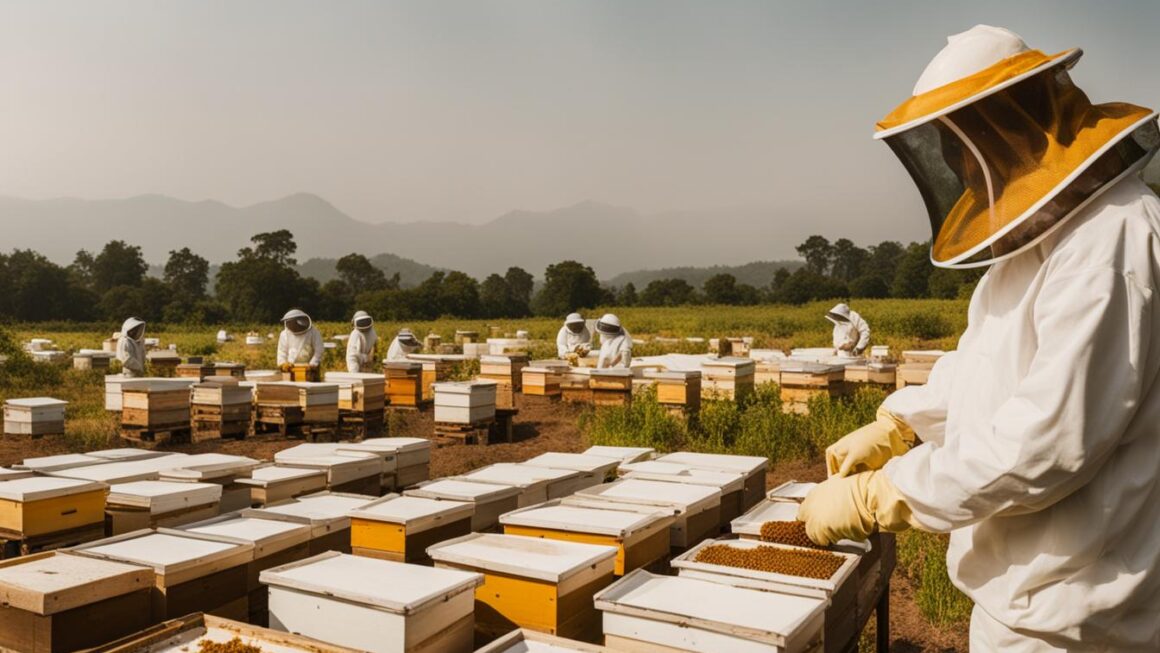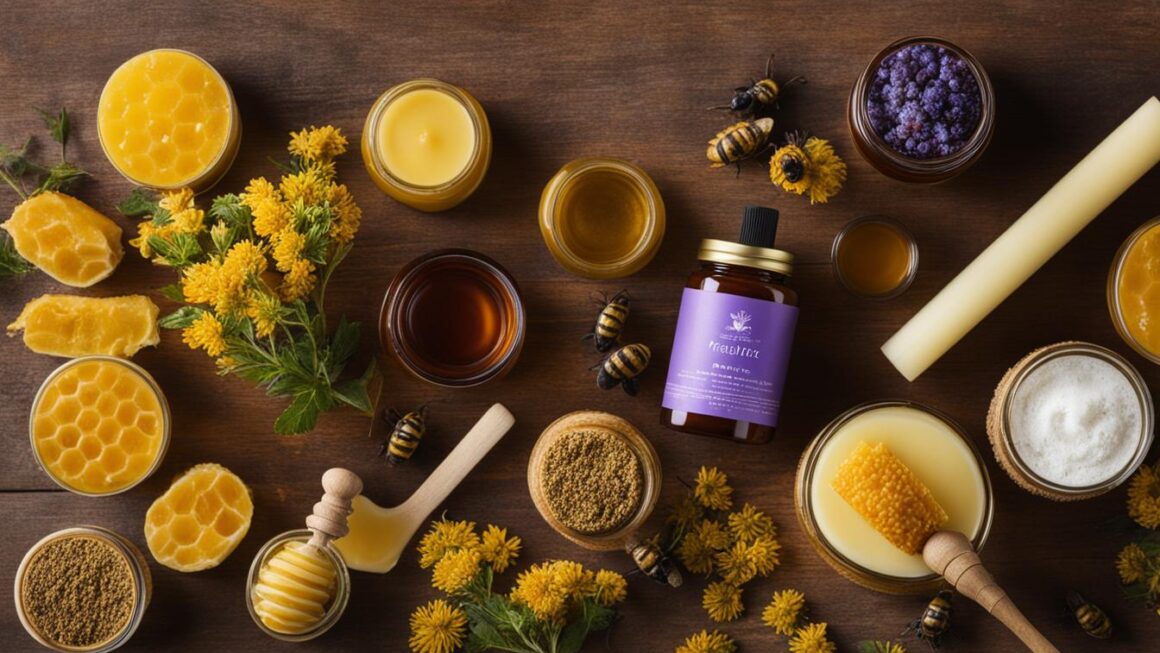Beekeeping is a fascinating and rewarding hobby that anyone, regardless of age or location, can enjoy. Not only does it allow you to connect with nature, but it also offers numerous benefits that make it truly special. From learning about the fascinating lives of bees to enjoying the delicious honey and wax products they produce, beekeeping has much to offer. Whether you are a beginner or have some experience, beekeeping is a hobby worth exploring.
Key Takeaways:
- Beekeeping is a rewarding and enjoyable hobby that connects you with nature.
- You can learn about the fascinating lives of bees and their important role in the environment.
- Beekeeping allows you to produce your own honey and wax products for personal use or to sell.
- Regardless of your level of experience, beekeeping offers endless opportunities for learning and discovery.
- Whether you live in a rural area or an urban setting, beekeeping can be pursued in various locations.
Is Beekeeping Right for You?
Beekeeping is a unique and fulfilling hobby that offers a range of benefits. However, it’s important to consider whether it’s the right fit for you before diving in. There are several key considerations to keep in mind when exploring the world of beekeeping.
Allergies and Safety
First and foremost, it’s essential to assess whether you have any allergies to bee stings. Beekeeping involves handling bees and working closely with them, and if you have a severe allergy, it may not be suitable for you. It’s important to prioritize your safety and well-being.
Time and Dedication
Beekeeping requires a certain level of commitment. It involves regular hive inspections, ongoing maintenance, and potential challenges associated with working with bees. It’s important to set aside enough time to properly care for your bees and stay consistent with their needs.
Learning and Education
Having a genuine interest in bees and a willingness to learn is also crucial. Beekeeping is a continuous learning process, and staying informed about the behavior, health, and needs of bees is key to successful beekeeping. If you have a passion for knowledge and enjoy immersing yourself in new subjects, beekeeping may be the right hobby for you.
While there are challenges to consider, beekeeping can be a rewarding and enjoyable hobby for those who are willing to put in the effort. It allows you to connect with nature, learn about the fascinating lives of bees, and contribute to the preservation of these essential pollinators. Take the time to assess whether beekeeping aligns with your interests, lifestyle, and safety considerations before embarking on this exciting journey.
| Pros | Cons |
|---|---|
| Opportunity to connect with nature | Potential allergies to bee stings |
| Learning about the fascinating lives of bees | Requires time and dedication |
| Possible extra income from selling honey and wax products | Continuous learning and education |
Table: Pros and Cons of Beekeeping
Learning About Bees
Before diving into the world of beekeeping, it’s important to have a basic understanding of honeybees and their behavior. By gaining knowledge about the fundamental ways in which bees live their lives, beekeepers can create a suitable environment for their bees and interpret the signs that the bees send throughout the year.
One of the key aspects to understand is the life cycle of a honeybee. Bees go through distinct stages, starting from egg to larva to pupa and finally emerging as an adult bee. Each stage plays a crucial role in the development and functioning of the colony. Understanding this life cycle helps beekeepers anticipate the needs of their bees and take appropriate actions to support their growth.
Furthermore, beekeepers should familiarize themselves with the different roles within a honeybee colony. Bees have specific jobs such as foragers, nurse bees, guards, and the queen. Each bee fulfills a vital function that contributes to the overall productivity and harmony of the colony. By understanding these roles, beekeepers can better comprehend the dynamics within their hives and ensure the well-being of their bees.
Finally, gaining knowledge about the factors that influence the health of honeybees is essential for successful beekeeping. This includes understanding the impact of environmental conditions, pests, diseases, and the availability of food sources. Beekeepers need to be able to recognize signs of stress or disease in their colonies and take appropriate measures to address these issues.
Getting the Right Equipment
When it comes to beekeeping, having the right equipment is essential for the success of your colonies. Here are some of the key supplies and tools you’ll need to get started:
Beehives
Choosing the right beehive is an important decision. There are several types available, each with its own advantages and considerations. The most common types include Langstroth, Warre, and Top Bar hives. Langstroth hives are the most popular choice among beekeepers due to their modular design and ease of management. Warre hives are known for their simplicity and low-cost construction, making them a great option for beginners on a budget. Top Bar hives, on the other hand, provide a more natural and bee-centric approach to beekeeping.
Beehive Frames
Beehive frames are used to support the honeycomb structure within the beehive. They can be made of wood or plastic and typically come in standard sizes to fit different hive types. Frames are an essential part of beekeeping as they provide a place for bees to build their comb and for beekeepers to easily inspect and harvest honey.
Hive Tools
A hive tool is a multipurpose tool that every beekeeper should have. It is used for prying open beehive boxes, separating frames, and scraping off excess propolis and wax. Hive tools come in different shapes and sizes, so choose one that feels comfortable in your hand and suits your needs.
Protective Clothing
Protective clothing is crucial for beekeepers, as it helps prevent stings and provides a sense of security when working with bees. A beekeeping suit or jacket with a veil is essential to protect your body and face. Additionally, wearing gloves and a hat can offer extra protection. It’s important to invest in high-quality protective clothing to ensure your safety and comfort during hive inspections.
By ensuring you have the necessary beekeeping supplies and equipment, you’ll be well-prepared to embark on your beekeeping journey. Remember to choose equipment that suits your needs and budget, and always prioritize the safety and well-being of both yourself and your bees.
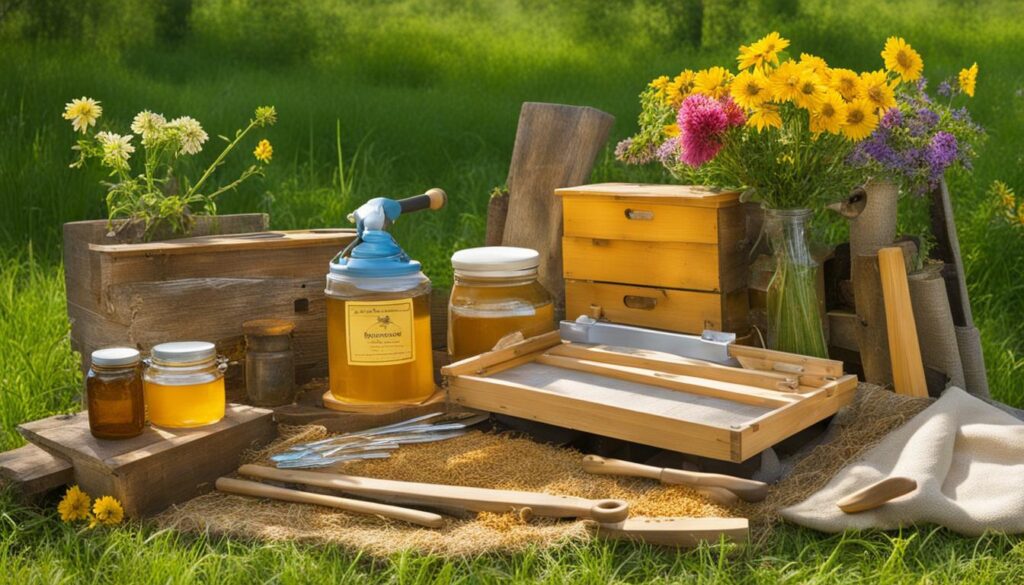
The Cost of Beekeeping
Beekeeping, like any hobby or venture, comes with its own set of expenses. Understanding the cost of beekeeping is essential for budgeting and planning before diving into this rewarding hobby. Factors such as equipment, supplies, and ongoing maintenance contribute to the overall expenses of beekeeping.
Below is a breakdown of the key expenses to consider:
| Expense | Estimated Cost |
|---|---|
| Beehive | $100 – $300 |
| Frames | $15 – $30 (per 10 frames) |
| Hive Tool | $10 – $20 |
| Feeder | $5 – $20 |
| Protective Clothing | $50 – $100 |
| Bees | $100 – $200 (per colony) |
It’s important to note that the costs mentioned are approximate and can vary depending on your location and specific needs. Additionally, there may be additional expenses for tools and treatments required to maintain the health of your bee colonies.
To manage the costs of beekeeping, consider the following tips:
- Research and compare prices from different suppliers to find the best deals.
- Consider purchasing used equipment or joining local beekeeping associations where you might find secondhand equipment at a lower cost.
- Plan your beekeeping journey in phases, starting with the essentials and gradually expanding your equipment as your experience and interest grow.
- Take advantage of free or low-cost educational resources, such as online forums, YouTube tutorials, and local beekeeping workshops, to gain knowledge and skills without paying for expensive courses.
Remember, beekeeping can also generate income through the sale of honey, beeswax, and other hive products. This can help offset some of the initial and ongoing expenses. However, it’s important to have realistic expectations and not solely rely on beekeeping for financial gain.
By carefully considering and managing the costs associated with beekeeping, you can embark on this fulfilling and sustainable hobby without breaking the bank. With patience, dedication, and a well-planned budget, beekeeping can be a truly rewarding experience.
Beekeeping Courses and Resources
For those new to beekeeping, taking a beekeeping course can be immensely helpful. Many organizations and institutions offer courses specifically designed for beginners, covering topics such as hive management, disease prevention, and honey extraction. These classes provide a structured learning environment and the opportunity to ask questions and interact with experienced beekeepers. By enrolling in a beekeeping course, you can gain valuable knowledge and practical skills that will set you on the right path to successful beekeeping.
Aside from courses, there are also numerous books and online resources available that can supplement your learning journey. These resources provide detailed information about beekeeping techniques, hive management, and troubleshooting common issues. They can serve as helpful references as you navigate through the different stages of beekeeping. Additionally, online forums and communities dedicated to beekeeping are great places to seek advice and connect with fellow beekeepers who can offer guidance and support.
Recommended Beekeeping Courses
| Course Name | Institution/Organization | Description |
|---|---|---|
| Beekeeping Basics: Introduction to Apiculture | Local Beekeeping Association | Learn the fundamentals of beekeeping, including hive setup, bee behavior, and honey extraction. |
| Advanced Beekeeping Techniques | Beekeeping Academy | Build upon your basic knowledge and acquire advanced skills in beekeeping, focusing on disease prevention and colony management. |
| Organic Beekeeping: Sustainable Practices | Environmental Conservation Center | Explore methods of organic beekeeping that prioritize environmental sustainability and promote natural hive health. |
By investing in education through courses and utilizing appropriate resources, you can enhance your beekeeping skills and ensure the well-being of your bees. Continuously learning and staying updated with the latest practices and research will contribute to your growth as a beekeeper and help you overcome challenges that may arise. Remember, beekeeping is a journey of discovery, and the more knowledge you acquire, the more rewarding and fulfilling your experience will be.
The Best Time to Start Beekeeping
Starting beekeeping at the right time is crucial for the success of your colonies. It’s recommended to begin in early spring when trees and flowers are blooming, providing abundant sources of nectar and pollen for the bees. This allows the bees to build strong colonies and gather enough food to sustain themselves throughout the year. By starting in spring, you give your bees the best chance to thrive and establish themselves in their new environment.
However, it’s important to note that beekeeping is not just a seasonal hobby. The preparation for beekeeping should start in the fall or winter before the bees arrive. This includes researching and acquiring the necessary equipment, such as beehives and protective clothing, as well as familiarizing yourself with the basics of beekeeping. By planning ahead, you’ll be fully prepared when the ideal time to start beekeeping arrives.
Timing is crucial in beekeeping, and early preparation can save you from unnecessary delays or missed opportunities. It’s important to stay informed about the local climate and beekeeping conditions in your area. This will help you determine the specific timing for beekeeping based on regional factors such as temperature, weather patterns, and the availability of local bee suppliers. By understanding the optimal timing for beekeeping in your specific location, you can maximize the success of your colonies and ensure a bountiful harvest of honey and other hive products.
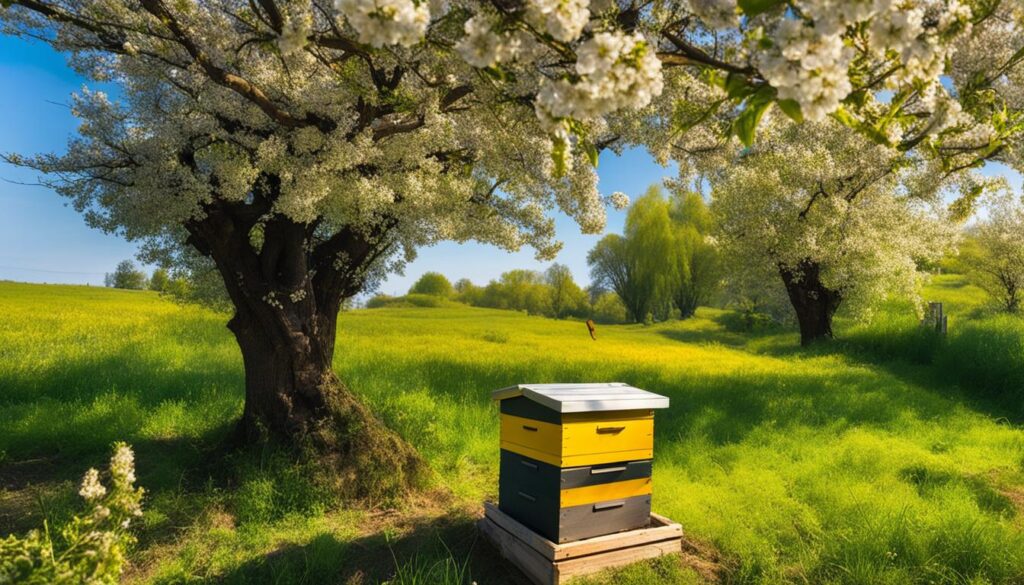
Benefits of Starting at the Right Time
Starting beekeeping at the right time offers several benefits. Firstly, it allows your bees to take full advantage of the natural resources available during the spring season, which leads to stronger and healthier colonies. Additionally, starting at the right time gives you ample time to learn and gain experience throughout the beekeeping season. This gradual learning process will help you understand the needs of your bees and become a more proficient beekeeper.
Moreover, starting early allows you to address any potential issues or challenges that may arise during the beekeeping season. You’ll have more time to observe your bees, identify any signs of disease or pests, and take appropriate action to maintain the health of your colonies. Being proactive and attentive to the needs of your bees can help prevent problems from escalating and ensure the overall success of your beekeeping venture.
In conclusion, the best time to start beekeeping is in early spring when the bees can take advantage of the abundant food sources available during this time. However, it’s essential to prepare in advance and be aware of the specific timing considerations for your region. By starting at the right time, you give your colonies the best chance to thrive and establish themselves, setting the stage for a rewarding and successful beekeeping experience.
Hive Management
Effective hive management is crucial for successful beekeeping. Regular hive inspections, proper management of honey bee colonies, and fulfilling beekeeping responsibilities are essential to ensure the health and productivity of your bees.
During hive inspections, beekeepers carefully examine the condition of the hive, including the frames, brood cells, and honey stores. This allows them to assess the overall health of the colony, identify any signs of disease or pests, and make necessary adjustments to maintain optimal conditions for the bees.
Managing honey bee colonies involves various tasks, such as providing supplemental feeding during periods of food scarcity, monitoring and controlling pests like Varroa mites, and taking appropriate measures to prevent swarming. Beekeepers must also ensure that their colonies have adequate ventilation, maintain proper hive temperature, and protect the bees from extreme weather conditions.
Beekeeping responsibilities extend beyond the hive itself. Beekeepers are encouraged to keep detailed records of their hive inspections, noting any observations, treatments administered, and other relevant information. These records serve as a valuable resource for tracking the progress and health of the colonies over time, making informed decisions, and identifying any patterns or trends that may impact the well-being of the bees.
Frequent communication and engagement with local beekeeping communities and associations can provide valuable support, guidance, and access to the latest research and best practices. By actively managing your hives and staying connected with other beekeepers, you can continuously improve your skills, contribute to the well-being of your bees, and enjoy a fulfilling beekeeping experience.
The Importance of Bees
Bees are not just tiny insects buzzing around; they play a crucial role in our environment and food production. Bee conservation is essential to maintain the delicate balance of our ecosystems and ensure the sustainability of our food supply.
One of the most significant contributions that bees make is pollination. As bees move from flower to flower in search of nectar, they transfer pollen from the male parts of the flower to the female parts, fertilizing the plants and allowing them to produce seeds and fruits. This process is vital for the reproduction of many flowering plants, including the crops we rely on for food.
“Bees are responsible for pollinating approximately one-third of the food crops that we consume daily.”
Without bees, the pollination process would be severely impacted, leading to decreased crop yields, lower quality produce, and even potential food shortages. Imagine a world without the sweet taste of honey, the juicy bite of an apple, or the refreshing scent of flowers—bees are the unsung heroes behind these delights.
| Importance of Bees | Contribution |
|---|---|
| Pollination | Crucial for the reproduction of flowering plants and food crops |
| Food Production | Helps to sustain the world’s food supply and maintain biodiversity |
| Ecosystem Health | Enables the survival of various plant and animal species |
| Biodiversity | Contributes to the preservation of diverse ecosystems |
Bee conservation is not just about protecting bees themselves; it is about safeguarding the intricate web of life in which they are a vital thread. By becoming a beekeeper, you are actively contributing to the preservation of these remarkable pollinators and supporting the health of our planet. So, whether you decide to take up beekeeping as a hobby or simply create a bee-friendly garden, your efforts can make a significant impact in ensuring a sustainable future for all.
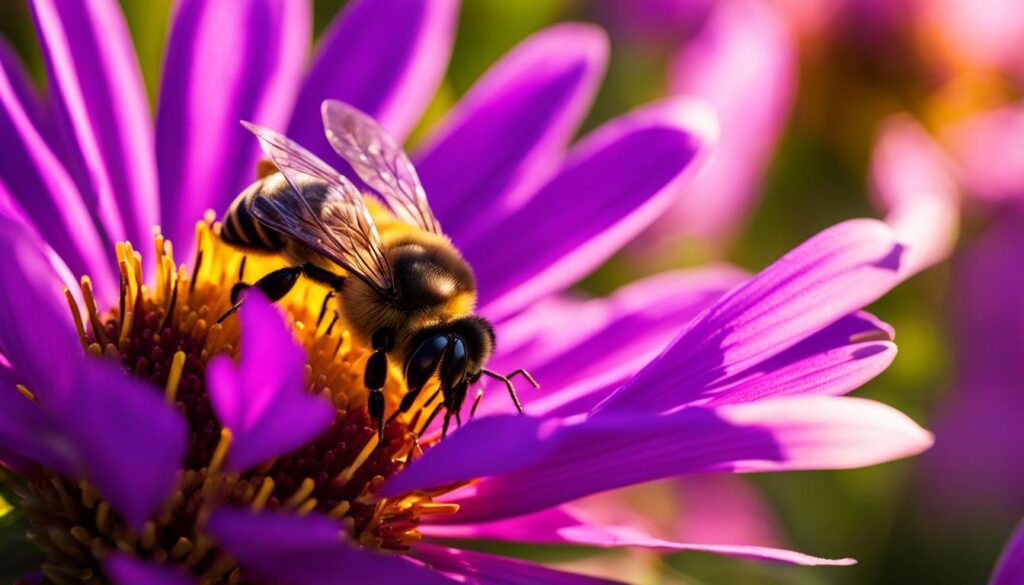
Conclusion
Beekeeping is a fulfilling and rewarding hobby that allows you to connect with nature, learn about the intricate lives of bees, and contribute to environmental sustainability. By starting with the right equipment, gaining adequate knowledge through courses and resources, and actively managing your colonies, you can enjoy the joy of bees and make a positive impact on the environment.
Throughout this article, we have explored the various aspects of beekeeping, from understanding honeybees and their behavior to the cost and timing considerations. We have also highlighted the importance of bees in our ecosystem and the role they play in pollination.
Whether you’re a beginner or an experienced beekeeper, beekeeping offers endless opportunities for learning, discovery, and personal fulfillment. It is a hobby that not only benefits you but also contributes to the preservation of these valuable pollinators and helps support the world’s food supply.
So, if you have a genuine interest in bees and are willing to put in the effort, why not give beekeeping a try? Embrace the world of beekeeping and experience the joy, wonder, and rewards it has to offer.
FAQ
Is beekeeping suitable for everyone?
Beekeeping is not suitable for everyone. Factors such as allergies to bee stings and the commitment required should be considered before starting.
What knowledge do I need before starting beekeeping?
It is important to have a basic understanding of honeybees, their life cycle, roles within the colony, and factors that contribute to their health and well-being.
What equipment do I need to start beekeeping?
Essential equipment includes a beehive, frames, hive tools, a feeder, and protective clothing such as a hat, veil, and gloves.
How much does beekeeping cost?
The cost of beekeeping can vary, but beginner beekeepers can expect to spend around $200 for basic equipment.
Are there resources available to learn about beekeeping?
Yes, there are beekeeping courses, books, and online resources available to educate and guide beginners in beekeeping.
When is the best time to start beekeeping?
The best time to start beekeeping is in early spring when trees and flowers are blooming, providing abundant food for bees.
How often do I need to manage my beehive?
Regular hive inspections and ongoing management are required, with monthly inspections being a standard practice.
Why are bees important?
Bees play a vital role in pollinating crops and maintaining biodiversity, ensuring the production of many fruits, vegetables, and nuts.

